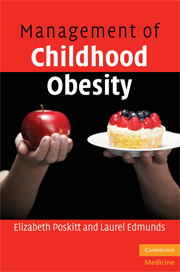Book contents
- Frontmatter
- Contents
- Foreword by David W. Haslam
- Preface
- Acknowledgements
- List of abbreviations
- 1 Introduction
- 2 How fat is fat? Measuring and defining overweight and obesity
- 3 Where should overweight/obese children be managed?
- 4 How do we approach the overweight/obese child and family?
- 5 The clinical assessment: what are the special points?
- 6 What complications should we look for now and later?
- 7 How does psychology influence management?
- 8 Management: what do we mean by lifestyle changes?
- 9 How can we reduce energy intake?
- 10 How can we increase energy expenditure?
- 11 What else can be done?
- 12 How can we sustain healthy weight management?
- 13 What can we do to prevent childhood overweight and obesity?
- References
- Index
7 - How does psychology influence management?
Published online by Cambridge University Press: 08 August 2009
- Frontmatter
- Contents
- Foreword by David W. Haslam
- Preface
- Acknowledgements
- List of abbreviations
- 1 Introduction
- 2 How fat is fat? Measuring and defining overweight and obesity
- 3 Where should overweight/obese children be managed?
- 4 How do we approach the overweight/obese child and family?
- 5 The clinical assessment: what are the special points?
- 6 What complications should we look for now and later?
- 7 How does psychology influence management?
- 8 Management: what do we mean by lifestyle changes?
- 9 How can we reduce energy intake?
- 10 How can we increase energy expenditure?
- 11 What else can be done?
- 12 How can we sustain healthy weight management?
- 13 What can we do to prevent childhood overweight and obesity?
- References
- Index
Summary
Research into childhood obesity has sometimes focused on searching for specific psychological traits in overweight/obese children. No consistent findings in relation to appetite and diet, physical activity or general behaviour distinguish overweight/obese children. Perhaps we should not expect findings since there is no good evidence that the obese consistently eat more or exercise less than the non-obese. However, this research was as population studies. At the individual level, particular behavioural and psychological characteristics can contribute to the development or persistence of obesity. As with everything else, each child is different.
Understanding the child in the family context
Childhood obesity is so stigmatized that it can be difficult to discuss the topic objectively – inside or outside the family or with health professionals. We have raised some of the problems parents may have acknowledging their overweight children's problems in Chapter 4. Here we look more at the attitudes and experiences of the children themselves and how these may interfere with coping with their overweight/obesity.
Challenges to psychological robustness
Children who are psychologically robust although aware of their obesity are well placed to make the lifestyle changes with which to improve their immediate or long-term health. For children who are less psychologically robust, improving their resilience when confronted with the negative perceptions of obesity amongst their peers may be the initial focus of management. Dietz (1998) has pointed out that for obese children the psychosocial consequences of being overweight/obese are worse than the risks of medical consequences.
- Type
- Chapter
- Information
- Management of Childhood Obesity , pp. 83 - 95Publisher: Cambridge University PressPrint publication year: 2008

